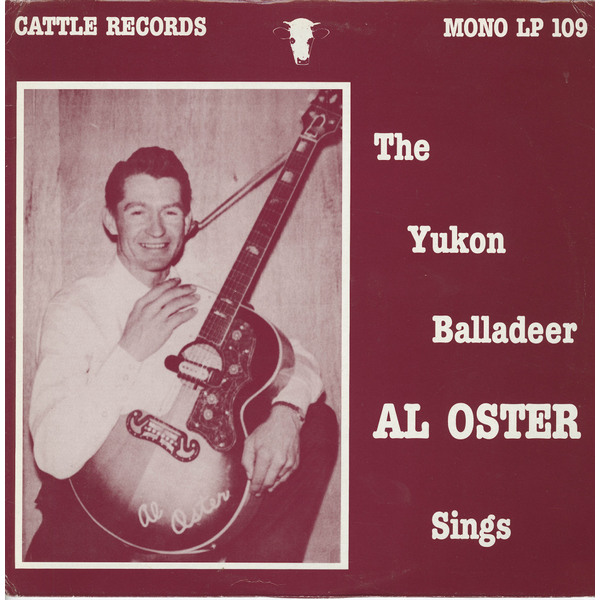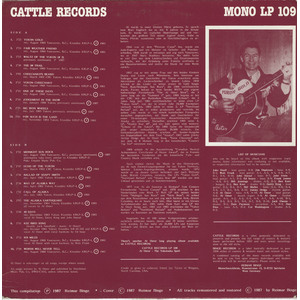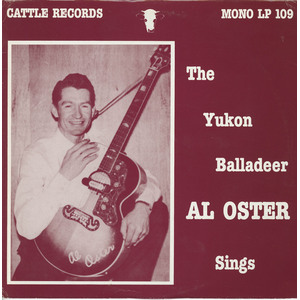Information/Write-up
Al Oster was born Albert Adam Oster on December 3, 1924, in a one-room homestead east of Vanguard, Saskatchewan, and grew up on the wide prairie near Macoun, where the harsh climate and long distances fostered the self-reliance that would later define his music. His family left the drought-stricken Prairies in 1939 and moved to Langley in the Fraser Valley of British Columbia. As a young man he roamed the ranches of central B.C. and western Alberta as a singing cowboy, writing his earliest songs and performing anywhere a stage or a hayloft dance would have him. He toured the B.C. interior with bands led by Mike Harris and Lynn Gibson, worked briefly with Hank Smith, and made guest appearances on Evan Kemp’s CJOR program “Buckskin Opry.” By the time he reached his early thirties, he had written dozens of country and western songs, including “After Tonight,” which was published and recorded in the United States.
In 1957 Oster, his wife Mary, and their two young children, Donna and Lorne, packed their car and a small trailer and set out for Whitehorse. The trip up the Alaska Highway entered family lore, a drive through nearly fifteen hundred miles of raw country with creeks, campsites, and wilderness that left a deep impression on him. When they arrived in Whitehorse on June 27, the Midnight Sun was blazing above the Yukon River, and the spell of the North took hold. He later wrote that they had come “to the Land of the Midnight Sun,” and he meant it literally. Warm weather, endless daylight, and the enormous friendliness of the people convinced him that this was home.
Oster worked as a salesman in a local store and wrote songs during lunch breaks, between customers, or backstage while performing at local dances. It was during one such break, sandwich in one hand and pencil in the other, that he wrote “Next Boat,” inspired by the constant sign merchants posted when waiting for crucial supplies to arrive from Skagway. “Midnight Sun Rock,” written during another short break at a dance hall, became one of the earliest and rarest Canadian rockabilly recordings, issued on the tiny Tundra T-101 label in a pressing of reportedly two hundred copies. Today it is considered a holy-grail artifact of Canadian rock history and was later reissued on international rockabilly compilations.
Recognizing the stories around him as untapped cultural gold, Oster formed Klondike Records and recorded his first LP, Yukon Gold, in 1960. He had gathered a small group of musician friends in Vancouver, recorded the songs on a Tandberg tape machine, and then converted them to a 15 IPS master for pressing at Quality Records in Toronto. The album, limited to an initial run of 1,000 copies, became a fixture in Yukon homes and tourist shops and is widely regarded as the first rock and roll album recorded in the Yukon. It also marked the beginning of his lifelong mission: to preserve northern history, characters, and legends through song.
In the following years he wrote and recorded ballads that drew on Klondike lore, Indigenous stories, Mountie tales, frontier tragedies, and contemporary events. His subjects included Soapy Smith, the notorious Alaskan con man; Norman Lee, who attempted a 200-head Klondike cattle drive; the S.S. Baychimo, the fabled ghost ship of the Arctic; old-time miners, sourdoughs, dreamers, and the riverboats that once ruled the Yukon River. Unlike the romanticized narratives found in many folk songs of the era, Oster’s lyrics were often based on interviews with old-timers, newspaper reports, and firsthand accounts, which he shaped into vivid musical storytelling.
By the mid-1960s he had established Alkon International Inc. in the United States to distribute his recordings in Alaska and the Pacific Northwest. He followed Yukon Gold with Northland Ballads, Northland Ballads Volume 2, and Alaska Star 49, as well as numerous singles recounting northern events such as the miraculous 49-day survival of Ralph Flores and Helen Klaben after their plane crashed in the Yukon wilderness. He hosted the CBC radio show Northland Echoes for three years, performed at Expo 67 in Montreal, and worked steadily with Yukon country singer Hank Karr, who later recorded a full LP of Oster’s compositions.
Oster’s songs travelled far beyond the North. Stompin’ Tom Connors recorded his tune “Paddlewheeler,” German and Dutch labels reissued his rockabilly sides, and CBC pressed The Yukon Stars, featuring Oster and Karr. In the 1970s he moved from the Yukon to British Columbia but returned every year, unable to escape what Robert Service famously called “the Spell of the Yukon.” He continued performing and writing, eventually updating earlier compositions in a 24-track studio for the LP Yukon Ballads.
Throughout the 1980s and 1990s he remained a tireless ambassador for the history that had inspired him. He released a 30-minute documentary film Yukon Gold in 1988, published a 100-page songbook filled with archival images and geographical notes, and licensed his compositions internationally. His work received formal recognition when he became the first Canadian composer in the country/folk category to receive the BMI Canada Certificate of Honour Achievement in 1968. Later came the Yukon Heritage Award in 1993, his appointment as a Member of the Order of Canada in 1999, the Queen Elizabeth II Golden Jubilee Medal in 2002, and his induction into the Rockabilly Hall of Fame in 2004.
Even after leaving the North, Oster never severed the connection. He believed the Yukon was a place that “gets into your blood” and never lets you go. His annual returns were pilgrimages to ensure the land still lived as he remembered it, a personal reaffirmation of the landscapes and people who shaped him. Until his passing in 2017 at age 92, he continued to write, correspond, archive, and reflect on a lifetime of storytelling rooted in the frontier spirit.
Across more than sixty original northern ballads, numerous LPs released in Canada, the United States, Germany, and Belgium, and a lifetime of self-driven historical research, Al Oster preserved the characters, legends, and landscapes of the Yukon and Alaska with a dedication unmatched in Canadian folk music. He was, as many have called him, the Northland Balladeer — a songwriter who transformed the lives of miners, stampeders, dreamers, outlaws, and lonely travellers into a lasting musical record of a frontier that few understood as deeply as he did.
-Robert Williston



No Comments